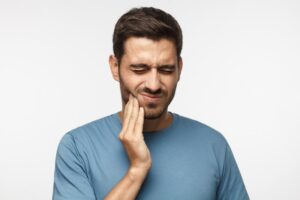
Waking up with jaw pain can be frustrating, confusing, and uncomfortable — especially if it seems to happen regularly. Morning jaw soreness is surprisingly common, and while it may feel like it comes out of nowhere, there are several possible causes behind it, including TMJ disorder. Understanding what’s happening can help you take the right steps toward relief. Here are some of the most common reasons your jaw might hurt when you wake up.
Nighttime Teeth Grinding (Bruxism)
One of the leading causes of morning jaw pain is bruxism — the habit of grinding or clenching your teeth while you sleep. Many people don’t even realize they’re doing it until they notice symptoms such as jaw soreness, headaches, flattened teeth, or chipped enamel.
Grinding puts intense pressure on the jaw joints and muscles, leading to soreness that’s most noticeable right when you wake up. Stress, anxiety, sleep disorders, and misaligned teeth can all contribute to this habit. A custom nightguard from your dentist is one of the most effective ways to protect your teeth and ease morning pain.
Temporomandibular Joint (TMJ) Disorders
The temporomandibular joints — the hinges connecting your jaw to your skull — work hard every day. If they become irritated or strained, the result can be TMJ disorder, which often causes jaw pain, clicking, popping, or stiffness.
When you sleep in certain positions or clench your jaw overnight, the TMJ can become more inflamed, leading to discomfort in the morning. TMJ disorders may also cause headaches, ear pain, or difficulty opening your mouth fully. If symptoms persist, your dentist can help identify the cause and recommend treatments such as bite adjustments, therapy, or oral appliances.
Poor Sleep Position
The way you sleep can affect more than just your back or neck — it can impact your jaw as well. Sleeping on your stomach or with your hand pressed against your jaw can place uneven pressure on your muscles and joints. Over several hours, this can lead to stiffness and soreness when you wake up.
Switching to sleeping on your back and using a supportive pillow can reduce strain and help your jaw stay relaxed through the night.
Sinus Pressure or Congestion
Your sinuses sit close to the upper jaw, so inflammation or congestion can create pressure that radiates into your cheeks and jawline. This is especially common during allergy season or when you have a cold.
If sinus issues are the cause, you may also notice nasal congestion, forehead pressure, or tenderness around your eyes. Treating the underlying sinus problem often helps relieve the jaw discomfort as well.
If jaw pain happens frequently, worsens, or interferes with chewing, talking, or sleeping, it’s time to schedule a visit. Your dentist can determine the underlying cause and recommend the right treatment, whether it’s a nightguard, TMJ therapy, or adjustments to your bite.
About the Author
Dr. Russell Teasdale has more than 40 years of experience practicing dentistry. He earned his dental degree from the Washington University School of Dental Medicine and has completed thousands of hours of continuing education, attending renowned educational institutes. He is a Fellow of the Las Vegas Institute for Advanced Dental Studies. If you’re suffering from TMJ disorder, schedule an appointment with us online or call (503) 974-3829.
